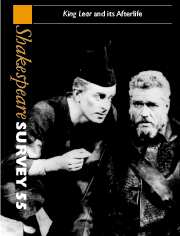Book contents
- Frontmatter
- King Lear: A Retrospect, 1980–2000
- How Shakespeare Knew King Leir
- Contracts of Love and Affection: Lear, Old Age, and Kingship
- Headgear as a Paralinguistic Signifier in King Lear
- What becomes of the broken-hearted: King Lear and the Dissociation of Sensibility
- Lear’s Afterlife
- Songs of Madness: The Lyric Afterlife of Shakespeare’s Poor Tom
- Secularizing King Lear: Shakespeare, Tate, and the Sacred
- ‘Look on her, look’: The Apotheosis of Cordelia
- Jacob Gordin’s Mirele Efros: King Lear as Jewish Mother
- ‘How fine a play was Mrs Lear’: The Case for Gordon Bottomley’s King Lear's Wife
- Some Lears
- King Lear and Endgame
- Shakespeare in Pain: Edward Bond’s Lear and the Ghosts of History
- ‘Think about Shakespeare’: King Lear on Pacific Cliffs
- Actors, Editors, and the Annotation of Shakespearian Playscripts
- Titus Andronicus: The Classical Presence
- Julius Caesar, Machiavelli, and the Uses of History
- Scepticism and Theatre in Macbeth
- Revels End, and the Gentle Body Starts
- ‘Taking just care of the impression’: Editorial Intervention in Shakespeare's Fourth Folio, 1685
- ‘A world elsewhere’: Shakespeare in South Africa
- Shakespeare Performances in England, 2001
- Professional Shakespeare Productions in the British Isles January–December 2000
- The Year's Contributions to Shakespearian Study 1 Critical Studies
- 2 Shakespeare’s Life, Times and Stage
- 3 Editions and Textual Studies (1) and (2)
- Books Received
- Index
King Lear: A Retrospect, 1980–2000
Published online by Cambridge University Press: 28 March 2007
- Frontmatter
- King Lear: A Retrospect, 1980–2000
- How Shakespeare Knew King Leir
- Contracts of Love and Affection: Lear, Old Age, and Kingship
- Headgear as a Paralinguistic Signifier in King Lear
- What becomes of the broken-hearted: King Lear and the Dissociation of Sensibility
- Lear’s Afterlife
- Songs of Madness: The Lyric Afterlife of Shakespeare’s Poor Tom
- Secularizing King Lear: Shakespeare, Tate, and the Sacred
- ‘Look on her, look’: The Apotheosis of Cordelia
- Jacob Gordin’s Mirele Efros: King Lear as Jewish Mother
- ‘How fine a play was Mrs Lear’: The Case for Gordon Bottomley’s King Lear's Wife
- Some Lears
- King Lear and Endgame
- Shakespeare in Pain: Edward Bond’s Lear and the Ghosts of History
- ‘Think about Shakespeare’: King Lear on Pacific Cliffs
- Actors, Editors, and the Annotation of Shakespearian Playscripts
- Titus Andronicus: The Classical Presence
- Julius Caesar, Machiavelli, and the Uses of History
- Scepticism and Theatre in Macbeth
- Revels End, and the Gentle Body Starts
- ‘Taking just care of the impression’: Editorial Intervention in Shakespeare's Fourth Folio, 1685
- ‘A world elsewhere’: Shakespeare in South Africa
- Shakespeare Performances in England, 2001
- Professional Shakespeare Productions in the British Isles January–December 2000
- The Year's Contributions to Shakespearian Study 1 Critical Studies
- 2 Shakespeare’s Life, Times and Stage
- 3 Editions and Textual Studies (1) and (2)
- Books Received
- Index
Summary
Since the 1960s, when it usurped the throne securely occupied till then by Hamlet, King Lear has reigned supreme as Shakespeare's masterpiece and the keystone of the canon. The last twenty years of the twentieth century have seen the play fall prey to a whole new tribe of critics, many of them hostile and bent on Bardicide. But none of them inclines one to doubt R. A. Foakes's prediction that 'for the immediate future King Lear will continue to be regarded as the central achievement of Shakespeare, if only because it speaks more largely than the other tragedies to the anxieties and problems of the modern world'.
As the touchstone of literary value and star witness in defence of the discipline, the tragedy is fated to be the target of every critical approach keen to stake its claim to priority. The most persuasive account of what Shelley deemed 'the most perfect specimen of the dramatic art existing in the world' seizes the flagship of the entire subject. King Lear has consequently become an exemplary site of contention between the leading schools of contemporary criticism; and to examine the most influential rival readings of Lear is to bring into focus not only the key disputes dividing Shakespeare studies today, but also the current predicament of criticism itself.
In his survey of critical views of King Lear between 1939 and 1979, G. R. Hibbard noted that 'a crucial shift was taking place round about 1960, not only in the controversy as to whether King Lear is, or is not, a Christian tragedy, but also in critical assumptions and methods'.
- Type
- Chapter
- Information
- Shakespeare SurveyAn Annual Survey of Shakespeare Studies and Production, pp. 1 - 11Publisher: Cambridge University PressPrint publication year: 2002
- 1
- Cited by

